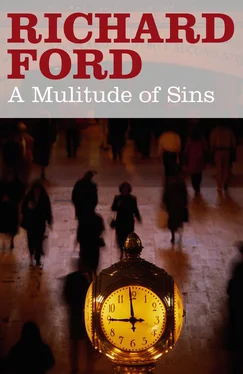When the station wagon eased to a stop, Steven sat for a minute with the motor running, the salmon-colored dash lights illuminating his face. The radio had been playing softly — the last of the news, then an interlude for French horns. Responding to no particular signal, he pressed off the radio and in the same movement switched off the ignition, which left the headlights shining on the empty, countrified road. The windows were down to attract the fresh spring air, and when the engine noise ceased the evening’s ambient sounds were waiting. The peepers. A sound of thrush wings fluttering in the brush only a few yards away. The noise of something falling from a small distance and hitting an invisible water surface. Beyond the stand of saplings was the west, and through the darkened trunks, the sky was still pale yellow with the day’s light, though here on Quaker Bridge Road it was nearly dark.
When Marjorie said what she had just said, she’d been looking straight ahead to where the headlights made a bright path in the dark. Perhaps she’d looked at Steven once, but having said what she’d said, she kept her hands in her lap and continued looking ahead. She was a pretty, blond, convictionless girl with small demure features — small nose, small ears, small chin, though with a surprisingly full-lipped smile which she practiced on everyone. She was fond of getting a little tipsy at parties and lowering her voice and sitting on a flowered ottoman or a burl table top with a glass of something and showing too much of her legs or inappropriate amounts of her small breasts. She had grown up in Indiana, studied art at Purdue. Steven had met her in New York at a party while she was working for a firm that did child-focused advertising for a large toymaker. He’d liked her bobbed hair, her fragile, wispy features, translucent skin and the slightly husky voice that made her seem more sophisticated than she was, but somehow convinced her she was, too. In their community, east of Hartford, the women who knew Marjorie Reeves thought of her as a bimbo who would not stay married to sweet Steven Reeves for very long. His second wife would be the right wife for him. Marjorie was just a starter.
Marjorie, however, did not think of herself that way, only that she liked men and felt happy and confident around them and assumed Steven thought this was fine and that in the long run it would help his career to have a pretty, spirited wife no one could pigeonhole. To set herself apart and to take an interest in the community she’d gone to work as a volunteer at a grieving-children’s center in Hartford, which meant all black. And it was in Hartford that she’d had the chance to encounter George Nicholson and fuck him at a Red Roof Inn until they’d both gotten tired of it. It would never happen again, was her view, since in a year it hadn’t happened again.
For the two or possibly five minutes now that they had sat on the side of Quaker Bridge Road in the still airish evening, with the noises of spring floating in and out of the open window, Marjorie had said nothing and Steven had also said nothing, though he realized that he was saying nothing because he was at a loss for words. A loss for words, he realized, meant that nothing that comes to mind seems very interesting to say as a next thing to what has just been said. He knew he was a callow man — a boy in some ways, still— but he was not stupid. At Bates, he had taken Dr. Sudofsky’s class on Ulysses , and come away with a sense of irony and humor and the assurance that true knowledge was a spiritual process, a quest, not a storage of dry facts — a thing like freedom, which you only fully experienced in practice. He’d also played hockey, and knew that knowledge and aggressiveness were a subtle and surprising and uncommon combination. He had sought to practice both at Packard-Wells.
But for a brief and terrifying instant in the cool padded semi-darkness, just when he began experiencing his loss for words, he entered or at least nearly slipped into a softened fuguelike state in which he began to fear that he perhaps could not say another word; that something (work fatigue, shock, disappointment over what Marjorie had admitted) was at that moment causing him to detach from reality and to slide away from the present, and in fact to begin to lose his mind and go crazy to the extent that he was in jeopardy of beginning to gibber like a chimp, or just to slowly slump sideways against the upholstered door and not speak for a long, long time— months — and then only with the aid of drugs be able merely to speak in simple utterances that would seem cryptic, so that eventually he would have to be looked after by his mother’s family in Damariscotta. A terrible thought.
And so to avoid that — to save his life and sanity — he abruptly just said a word, any word that he could say into the perfumed twilight inhabiting the car, where his wife was obviously anticipating his reply to her unhappy confession.
And for some reason the word — phrase, really — that he uttered was “ground clutter.” Something he’d heard on the TV weather report as they were dressing for dinner.
“Hm?” Marjorie said. “What was it?” She turned her pretty, small-featured face toward him so that her pearl earrings caught light from some unknown source. She was wearing a tiny green cocktail dress and green satin shoes that showed off her incredibly thin ankles and slender, bare brown calves. She had two tiny matching green bows in her hair. She smelled sweet. “I know this wasn’t what you wanted to hear, Steven,” she said, “but I felt I should tell you before we got to George’s. The Nicholsons’, I mean. It’s all over. It’ll never happen again. I promise you. No one will ever mention it. I just lost my bearings last year with the move. I’m sorry.” She had made a little steeple of her fingertips, as if she’d been concentrating very hard as she spoke these words. But now she put her hands again calmly in her minty green lap. She had bought her dress especially for this night at the Nicholsons’. She’d thought George would like it and Steven, too. She turned her face away and exhaled a small but detectable sigh in the car. It was then that the headlights went off automatically.
George Nicholson was a big squash-playing, thick-chested, hairy-armed Yale lawyer who sailed his own Hinckley 61 out of Essex and had started backing off from his high-priced Hartford plaintiffs’ practice at fifty to devote more time to competitive racket sports and senior skiing. George was a college roommate of one of Steven’s firm’s senior partners and had “adopted” the Reeveses when they moved into the community following their wedding. Marjorie had volunteered Saturdays with George’s wife, Patsy, at the Episcopal Thrift Shop during their first six months in Connecticut. To Steven, George Nicholson had recounted a memorable, seasoning summer spent hauling deep-water lobster traps with some tough old sea dogs out of Matinicus, Maine. Later, he’d been a Marine, and sported a faded anchor, ball and chain tattooed on his forearm. Later yet he’d fucked Steven’s wife.
Having said something, even something that made no sense, Steven felt a sense of glum and deflated relief as he sat in the silent car beside Marjorie, who was still facing forward. Two thoughts had begun to compete in his reviving awareness. One was clearly occasioned by his conception of George Nicholson. He thought of George Nicholson as a gasbag, but also a forceful man who’d made his pile by letting very little stand in his way. When he thought about George he always remembered the story about Matinicus, which then put into his mind a mental picture of his own father and himself hauling traps somewhere out toward Monhegan. The reek of the bait, the toss of the ocean in late spring, the consoling monotony of the solid, tree-lined shore barely visible through the mists. Thinking through that circuitry always made him vaguely admire George Nicholson and, oddly, made him think he liked George even now, in spite of everything.
Читать дальше












